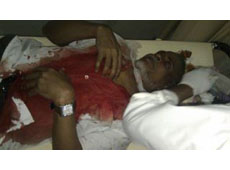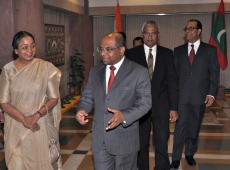The High Court has granted former President Mohamed Nasheed additional time to respond to procedural matters raised by the Judicial Services Commission (JSC) in the case submitted by his defense counsel, challenging the legitimacy of the three-member bench appointed by the JSC to his trial at the Hulhumale’ Magistrate Court.
The JSC, raising procedural issues, stated that the High Court does not have the jurisdiction to preside over the case submitted by the former president’s legal team.
Nasheed and his counsel stated several times during today’s hearing that the JSC’s procedural points were not completely clear.
The High Court judges panel gave Nasheed’s lawyers the opportunity to ask the JSC’s legal representation for clarifications, while posing additional questions regarding the same issue themselves.
They then stated that it was unclear why the JSC had asked for the counsel of the Supreme Court in deciding the composition of the bench, and the justification under which the JSC considered the Supreme Court’s counsel to be of the same legal weight as a ruling of the court.
In responding to the questions posed to them, the JSC revealed that the names of the magistrates they had sent to the Supreme Court for their counsel were not the names nominated by the Hulhumale Magistrate Court.
The High Court bench questioned JSC if there it is a procedure in place which allows the assignment of judges for specific cases.
The JSC responded that there were certain circumstances in which judges can be assigned for specific cases, adding that the commission had done so previously in certain cases.
The bench further asked the JSC several times as to whether they considered the Supreme Court’s ‘counsel’ a ‘ruling’. The JSC’s legal team confirmed that they did.
The JSC’s legal representation stated that the Hulhumale’ Court Bench had been established under the counsel of the Supreme Court, and that this held the weight of a Supreme Court ruling.
Nasheed’s legal team contested this, stating that ‘counsel’ and a ‘ruling’ of the Supreme Court cannot be considered to hold the same strength.
Upon receiving answers for some of the questions posed, Nasheed’s lawyers requested for more time to prepare a response, which the bench granted.
In concluding the hearing, the High Court judge’s bench stated that the next hearing of the case would be arranged in the near future, at which Nasheed’s legal team is expected to respond to the procedural matters raised by JSC.
The bench added that in an additional hearing which will be held closely following the next one, the High Court will reveal its ruling on the same matters.
JSC’s request to expedite case
In April, the JSC sent a letter to the High Court requesting that the case be expedited.
The letter was signed by JSC Vice Chair Criminal Court Judge Abdulla Didi, and it was later revealed that it had been sent without consultation with other members of the commission.
JSC member appointed from among the public, Sheikh Shuaib Abdul Rahman, told media that he believed the letter was sent under orders of JSC Chair Adam Mohamed, adding that the Chair did not have the authority to make such decisions without consulting the commission members.
“I believe that whoever advised for this letter to be sent has done so with the intention of influencing Nasheed’s case to be concluded in a particular way,” he had said at the time.
Shuaib’s contention was later backed by Speaker of Parliament Abdulla Shahid, who also sits on the commission.
However, JSC media official Hassan Zaheen stated that he did not believe that sending the letter would exert any undue influence or pressure, even though the JSC is currently looking into disciplinary matters concerning the Chief Judge of the High Court. He added that similar letters had been sent in the past at the discretion of the JSC Chair.
The case in question is one filed by the defense counsel of Nasheed, challenging the legitimacy of the panel of judges presiding over the case against him for the arbitrary detention during his administration of Criminal Court Chief Judge Abdulla Mohamed.
Nasheed and his party contend the case is a politically motivated attempt to convict and prevent him from contesting in the upcoming September 7 presidential elections.
Lawyers representing the JSC has even previously requested the High Court dismiss the case, contending the court did not have the jurisdiction to preside on the matter.
Upon accepting the case, the HIgh Court issued a stay order on Hulhumale’ Magistrate Court to suspend all criminal trials concerning the arrest of the judge until a ruling on the legitimacy of the bench is issued.
Likes (1)Dislikes
(1)Dislikes (0)
(0) 



